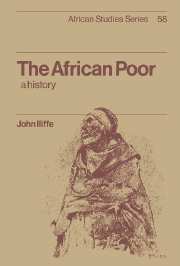Book contents
- Frontmatter
- Contents
- Preface
- 1 The comparative history of the poor
- 2 Christian Ethiopia
- 3 The Islamic tradition
- 4 Poverty and power
- 5 Poverty and pastoralism
- 6 Yoruba and Igbo
- 7 Early European initiatives
- 8 Poverty in South Africa, 1886–1948
- 9 Rural poverty in colonial Africa
- 10 Urban poverty in tropical Africa
- 11 The care of the poor in colonial Africa
- 12 Leprosy
- 13 The growth of poverty in independent Africa
- 14 The transformation of poverty in southern Africa
- Notes
- Bibliography
- Index
14 - The transformation of poverty in southern Africa
Published online by Cambridge University Press: 31 October 2009
- Frontmatter
- Contents
- Preface
- 1 The comparative history of the poor
- 2 Christian Ethiopia
- 3 The Islamic tradition
- 4 Poverty and power
- 5 Poverty and pastoralism
- 6 Yoruba and Igbo
- 7 Early European initiatives
- 8 Poverty in South Africa, 1886–1948
- 9 Rural poverty in colonial Africa
- 10 Urban poverty in tropical Africa
- 11 The care of the poor in colonial Africa
- 12 Leprosy
- 13 The growth of poverty in independent Africa
- 14 The transformation of poverty in southern Africa
- Notes
- Bibliography
- Index
Summary
The very poor of twentieth-century Africa showed much continuity with earlier periods. Most were either those made destitute by famine or those unable to work and neglected by others. The able-bodied, even when deprived of land or other resources, generally found work to avert extreme poverty, except at moments of conjunctural unemployment.
In southern Africa, however, new patterns of poverty emerged during the later twentieth century. The very poor of the past survived, but to them were added victims of structural rather than conjunctural unemployment: able-bodied men and women who could not compensate for their lack of resources by working for others, because no such work existed. For them, to belong to a large family could be a reason for poverty rather than a source of wealth as in the past. Southern Africans began to suffer the land-scarce family poverty long predominant in more densely peopled continents. They suffered it especially severely because the South African government sought, with considerable but incomplete success, to remove and confine the poor to the most remote countryside.
The National Party gained power in South Africa in 1948 with a determination to check African urbanisation, redirect labour to farms, and ensure that those Africans indispensable in towns should live not in freehold townships or squatter settlements but in segregated, orderly, and easily controlled locations. This required not merely urban reform but almost total urban rebuilding. The Group Areas Act of 1950 gave power to relocate population groups.
- Type
- Chapter
- Information
- The African PoorA History, pp. 260 - 277Publisher: Cambridge University PressPrint publication year: 1987

